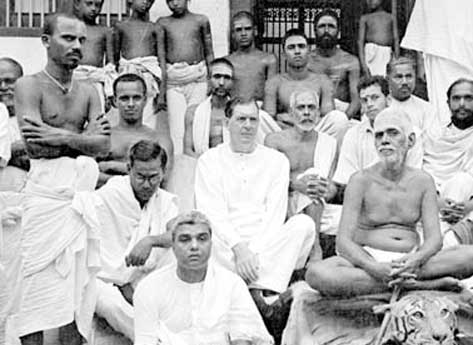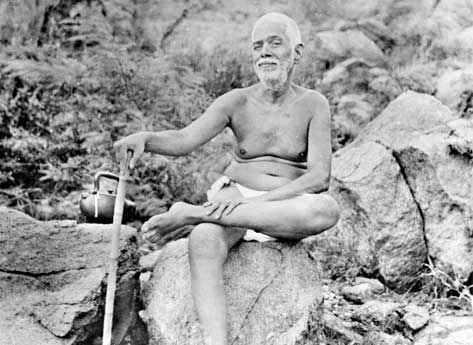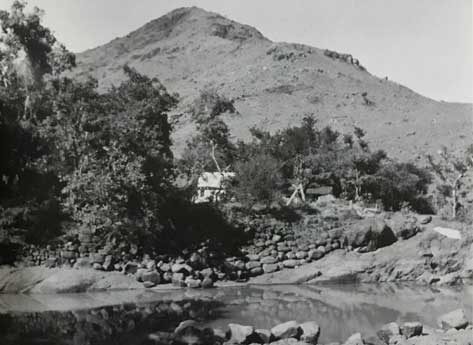8. Lessons learnt
THE STORY OF SRI ANNAMALAI SWAMI
Bhagavan instructed us in so many practical ways
Bhagavan was living proof of the timeless wisdom that ‘Serving at the feet of your Guru by surrendering to him unconditionally, by following his instructions completely ‘ is the way to spiritual enlightenment. Sri Annamalai Swami was an exemplary disciple, who followed the instructions of his teacher to near perfection. And on the rare occasions that he didn’t, he repented it.
My yearning for Giri Pradakshina
I cannot say that I always enjoyed working so hard. It would have been nice to have had a day off occasionally. I once tried to take a short break but it had such disastrous consequences that I never tried again. It happened when I was feeling very tired because of a long period of work without any rest. I went in and asked Bhagavan if I could take a break from my duties and do giri pradakshina (walking around the mountain). I told him that I had this desire to do a pradakshina for some time.
Bhagavan knew that I had a lot of work pending so initially he refused to give permission. He didn’t actually say ‘no’, he just kept silent. I should have accepted his silence as an answer but rather stupidly I persisted with the request.
Finally Bhagavan gave me a positive answer. ‘You are often saying that you want time off so that you can do some meditation. Do giri pradakshina and meditate while you are walking.’
I walked around the hill but my mind was too restless to meditate. I felt guilty about abandoning my work. My feelings of guilt increased enormously when I arrived back at the ashram. I was told that as soon as I had left the ashram Bhagavan had abandoned his sofa and had begun to supervise the work which I had chosen to neglect. He had been out in the sun, supervising the work, for all the hours that I had been away. No one had managed to persuade him to go inside. Those devotees who had come for his darshan had been forced to do their namaskaram in the mud and lime that surrounded his feet. Many were understandably upset with me.
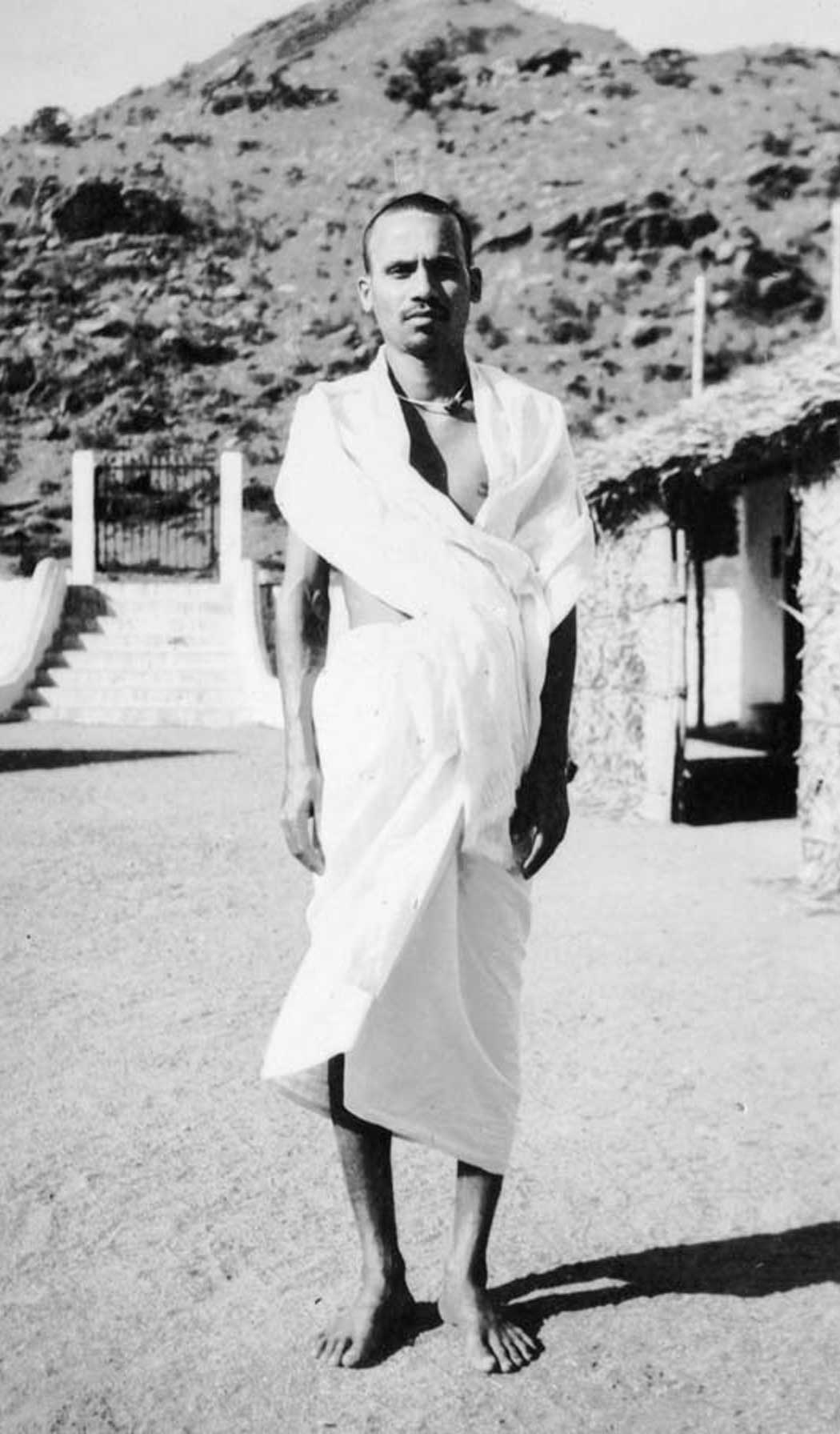
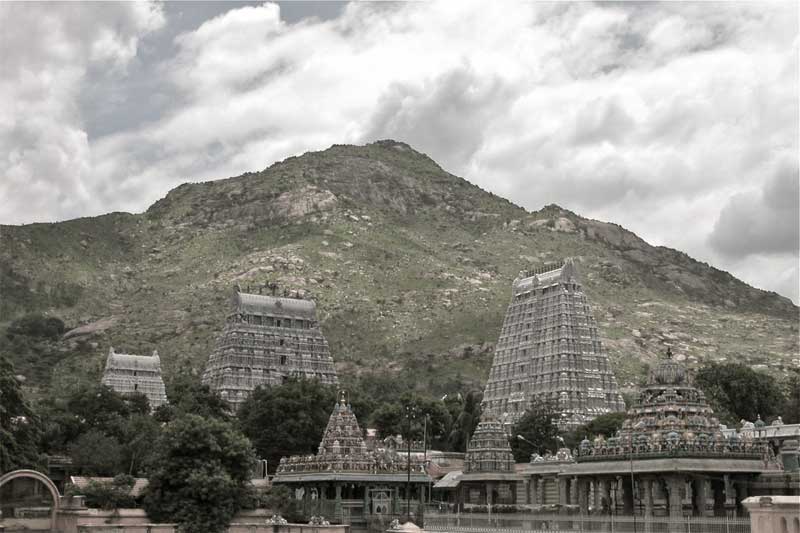
Importance of not wasting things
Bhagavan insisted on frugality and disliked wasting anything.
I was supervising the construction of the new dining room. Bhagavan had given me a rusty, bent nail and asked me to clean it, straighten it, and use it in the dining room.
‘But Bhagavan,’ I protested, ‘we have just received many kilos of brand-new nails. We don’t need to use old ones like this.’
Bhagavan disagreed. After telling me that everything that was useful should be used, he repeated his instructions about renovating the nail.
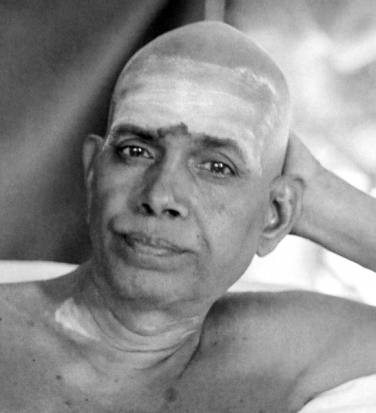
Simplicity in food
Although Bhagavan was willing to spend several hours each day ensuring that the ashram food was cooked properly, he disliked elaborate meals consisting of many dishes. He was quite satisfied with rice, sambar and one vegetable dish.
A lady from Kerala once came for darshan and insisted on cooking for everyone. After a lot of time and effort she made thirty two separate dishes. Bhagavan allowed her to serve each item on his banana leaf, but when the serving was over he mixed up all the offerings into a single homogenised lump. By way of explanation he told her:
You had to expend a lot of energy to prepare this much food. One vegetable – which is enough to clean the stomach and keep one free of constipation – is enough. Why make all this?’
‘If you prepare thirty two dishes, the mind is always thinking, “Shall I eat this one or that one?” So the mind is also dissipated while eating. If there is one dish there is no trouble. We can eat it very simply.’
‘Also meals like this set a bad example to people who have no food. Poor people will get to hear that we are serving luxurious meals and think, “We are hungry but these people who are supposed to be simple sādhus are eating so many dishes.” Thoughts like this will cause unnecessary jealousy.’
Later he added, ‘If Bhagavan were to eat one dish first, the woman who is serving will think, “Oh, Bhagavan likes this very much”. Then she will come and put another helping on my plate. This is why I mix everything into a single ball.’
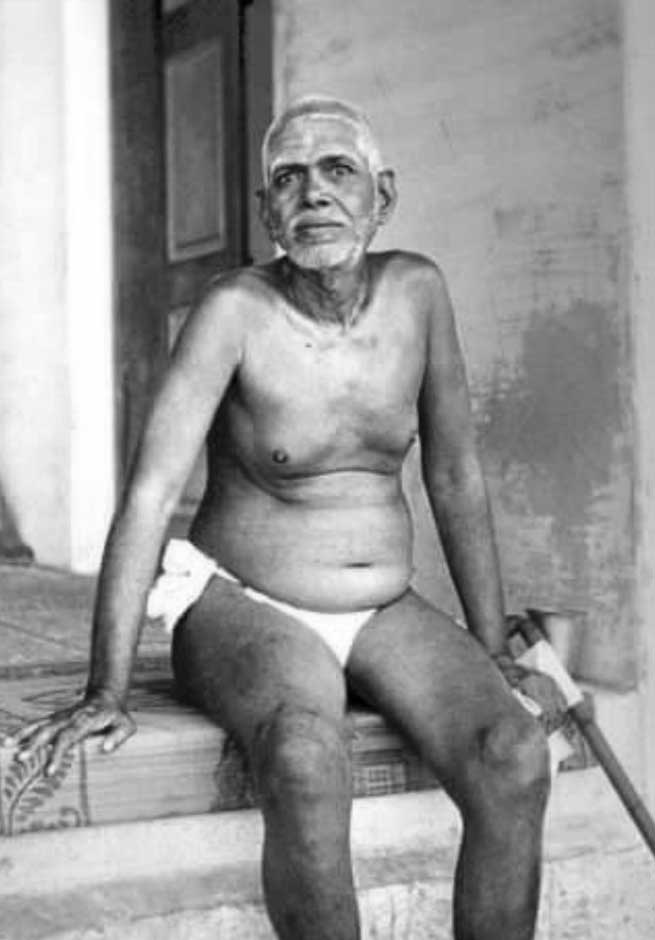
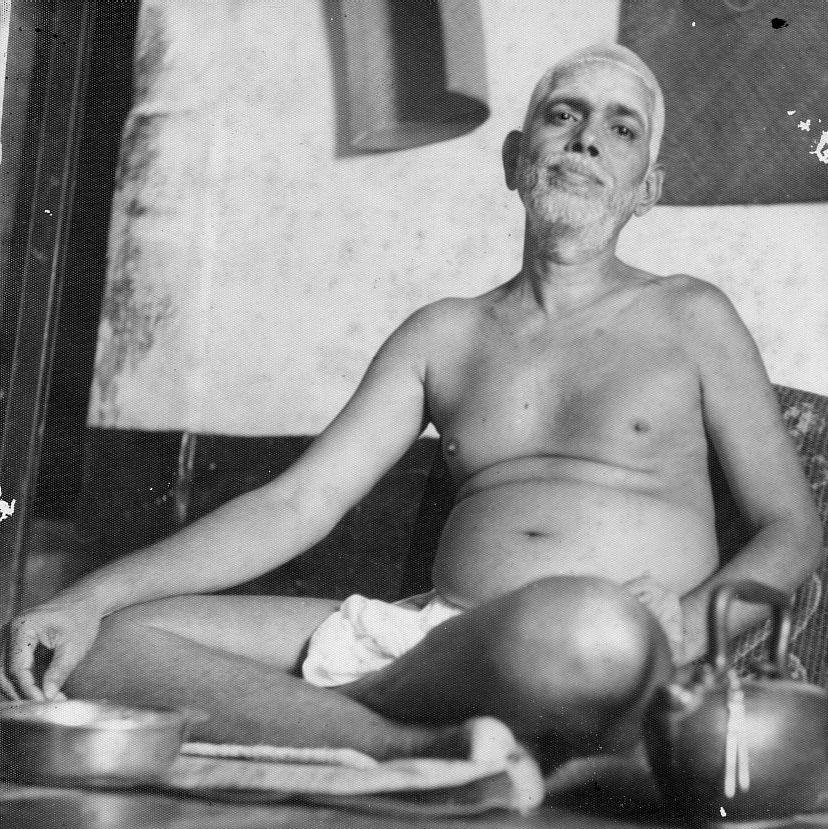
No Paradesis in the first batch
On jayanti day (the day of Bhagavan’s birthday celebration) it was the ashram’s custom to feed anyone who came. There were large, unruly crowds that day as lot of the visitors came only because they wanted a free meal. On that day, just before lunch, Bhagavan heard Chinnaswami calling out in a loud voice, ‘No paradesis (sannyasins) in the first batch!’.
Bhagavan, who was walking towards the dining room, turned back and went inside the old hall. He evidently regarded himself as a paradesi and felt that he had been barred from the dining room. This created a big problem becasue it was a long-established custom that no one should eat until Bhagavan had begun his meal. Chinnaswami came to the hall, apologised for giving such a discriminatory order, and requested Bhagavan to come and eat the the first sitting. Several of the older devotees also pleaded with Bhagavan to eat.
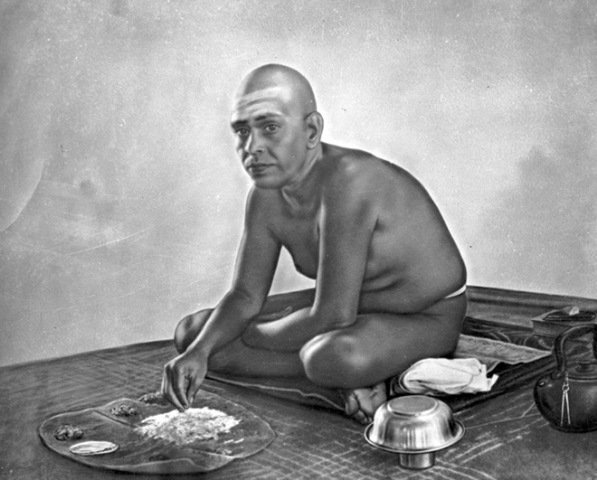
Chinnaswami readily agreed to this condition because the whole feeding programme involving thousands of people, could not be initiated until Bhagavan took his seat in the dining room.
Compassion for animals
Whenever Lakshmi (the cow) came for darshan she would walk very fast, straight towards Bhagavan. When she reached Bhagavan’s couch she would often stand in front of Bhagavan and put her head on his feet. If she came a little closer he would gently caress her head and neck. Often, they would be so close together that Lakshmi’s saliva would fall on Bhagavan’s body. If any special food was cooked in the ashram, Bhagavan would serve some to Lakshmi in the hall itself. I have seen him serving her iddlies, payasam and vadai, all on a banana leaf, just as if she were a human being.
Like this there are numerous accounts of Bhagavan showing his boundless compassion towards animals.
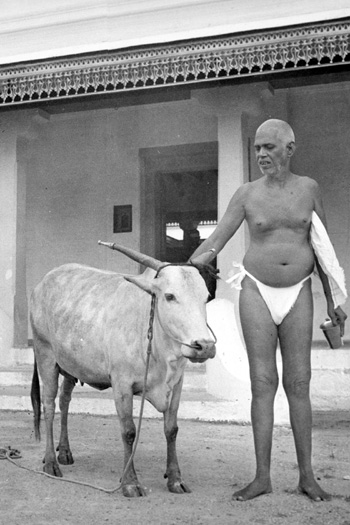
Killing insects
Bhagavan’s compassion towards animals was not universal, as this incident reveals. One morning Bhagavan noticed that a large number of black ants were entering the hall through the drainage hole. Turning to me Bhagavan said,
‘Find out where these ants are coming from. If there is a nest in there, block up the exit so that the ants cannot come into the hall. You must do this work quickly because all the devotees will be coming back at 3 p.m.’
I prised out the flagstone that the drainage hole was on. As I pulled the stone out of the wall I saw a large colony of black ants living in a hole behind it. Some of them even started to crawl over Bhagavan’s sofa. There were so many on the floor around my feet that I couldn’t have taken a step without killing some of them. Bhagavan noticed that I had been immobilised by my fear of unnecessarily killing any ants.
‘Why are you just standing there and looking at them?’ asked Bhagavan. ‘You must close up the hole before the devotees come back. Tell me what you need to finish the job properly and I will bring it for you.’ As I was much too worried about killing the ants and hence did not reply, Bhagavan repeated his offer: ‘Tell me what you want and I shall go and fetch it for you. Shall I bring some broken bricks and a little cement?’
This time I explained my inactivity. ‘There are ants everywhere, Bhagavan. I cannot move or do any work without killing some of them.’
With this assurance I filled in the hole with bricks and cement. Many ants died in the process. I discovered later that Bhagavan generally discouraged devotees from killing insects unless they were causing or about to cause injury or suffering to people or animals.
The importance of following instructions
I remember one occasion when he taught the cooks how to make aviyal properly. Bhagavan had insisted on many occasions that the chillies and other spices should be ground into a paste before the were added to the simmering vegetables. Since this was a very laborious and time-consuming activity, the cooks once decided to add powdered spices to the meal instead of had-ground paste. Bhagavan somehow found out what had happened. On the next occasion that the aviyal was prepared, Bhagavan himself came to the kitchen and ground the spices.
I happened to walk into the kitchen while he was doing the work. Noticing that he alone was working and that all the women were standing around watching, I said, ‘There are many people working in the kitchen. Why is Bhagavan alone doing this work?’
Bhagavan explained what was going on: ‘I told them to make a paste out of the chillies but they didn’t follow my instructions. So, to make sure that it is done properly, I am doing the work myself. It is no hardship for me. It is good exercise for the hands and arms.’
I turned to the women and scolded them a little: ‘There are so many people here but you are letting Bhagavan do all the hard work. Why are you idly standing around like this?’
Bhagavan made no comment; he just carried on grinding. Then the women started saying ‘Let me do it,’ ‘I will do it,’ ‘Let me take over’.
Keeping the premises clean
I can remember another occasion when Bhagavan taught us a lesson by doing work himself. There was a room near the kitchen which was rarely cleaned. It was dusty and dirty and the floor was usually covered with old banana leaves and vegetable cuttings. Many people walked through this room but no one ever took the trouble to tidy it.
To all volunteers he gave the same reply:
‘Only now your eyes are on this. Did you not see the mess before?’
Bhagavan collected all the rubbish on a large piece of paper, took it outside and threw it away. From that day on the room was cleaned regularly.
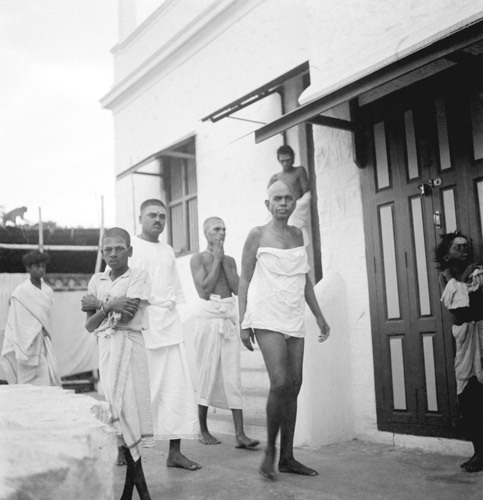
Correct yourself first
Bhagavan taught that one should reform oneself rather than find fault with others. In practical terms this means that one should find the source of one’s own mind rather than make complaints about other people’s minds and actions. I can remember a typical reply that Bhagavan gave on this subject.
A devotee, who was quite intimate with Bhagavan, asked him, ‘Some of the devotees who live with Bhagavan behave very strangely. They seem to do many things that Bhagavan does not approve of. Why does Bhagavan not correct them?’
Bhagavan replied, ‘Correcting oneself is correcting the whole world. The sun is simply bright. It does not correct anyone. Because it shines, the whole world is full of light. Transforming yourself is a means of giving light to the whole world.’
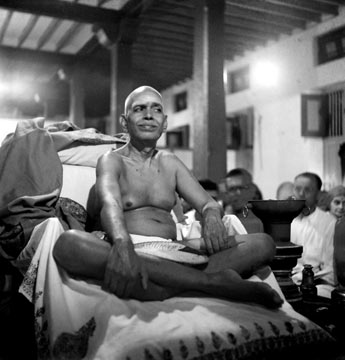
Once, while I was sitting in the hall, someone complained to Bhagavan about one of the devotees who was sitting there: ‘He is not meditating here, he is just sleeping.’
‘How do you know?’ retorted Bhagavan. ‘Only because you yourself gave up your meditation to look at him. First see yourself and don’t concern yourself with other people’s habits.’
Bhagavan points out
Related Content
9. More Jobs, Lessons
Bhagavan kept Sri Annamalai Swami continuously busy with one project after another including the construction of the new dining room, kitchen, Mother's temple and several miscellaneous works. The earnest and…
10. Samadhi Experience
This incident happened in 1938, ten years after Sri Annamalai Swami came to Ramansramam to serve Bhagavan Ramana Maharshi. It had such a profound impact that it ended his construction work and prompted him to…
11. Life in Palakothu
Palakothu is an area of land immediately to the west of the ashram. Several of Bhagavn's devotees who didn't want to stay full-time in the ashram lived and meditated there. Sri Annamalai Swami moved to…
